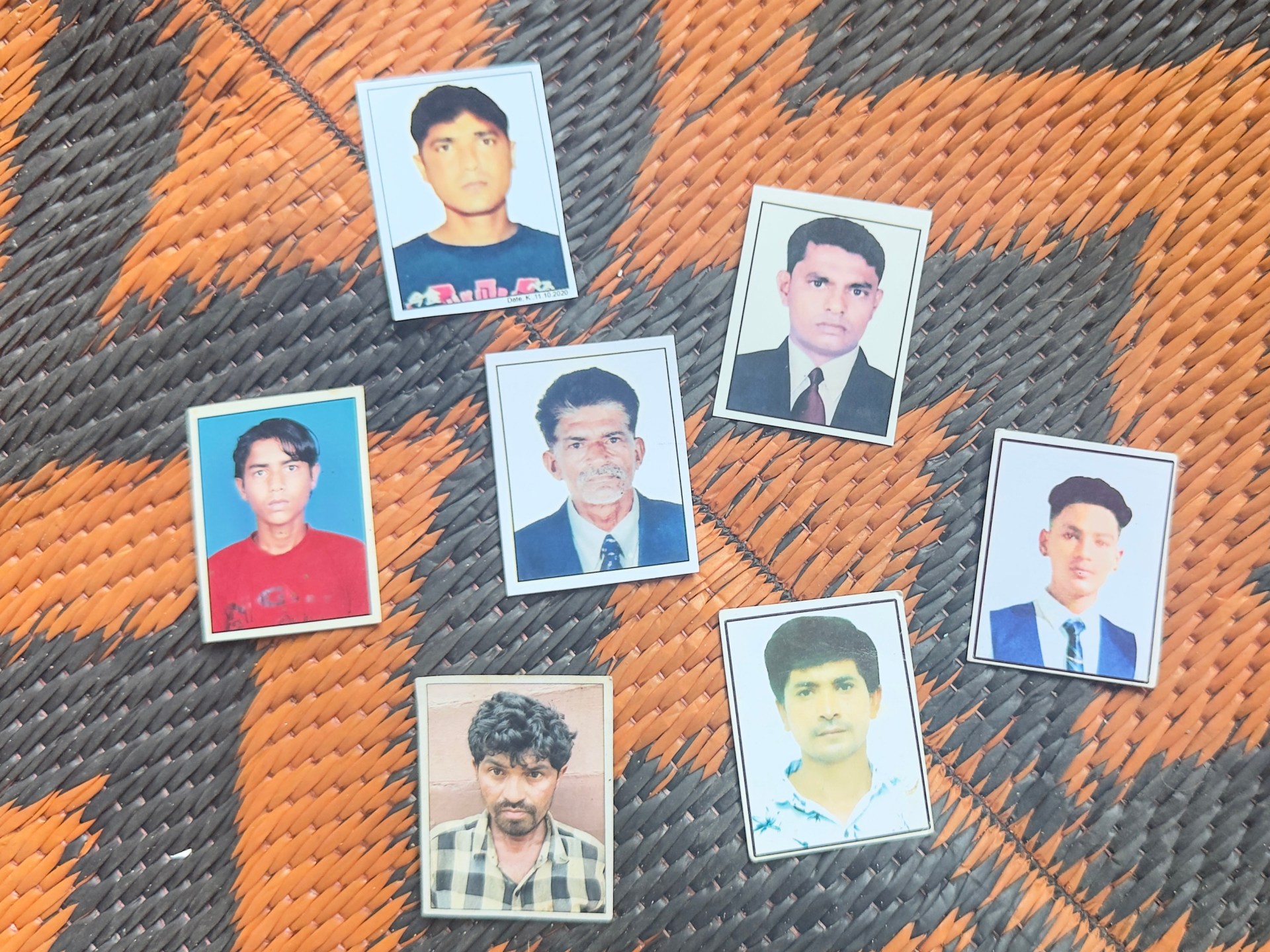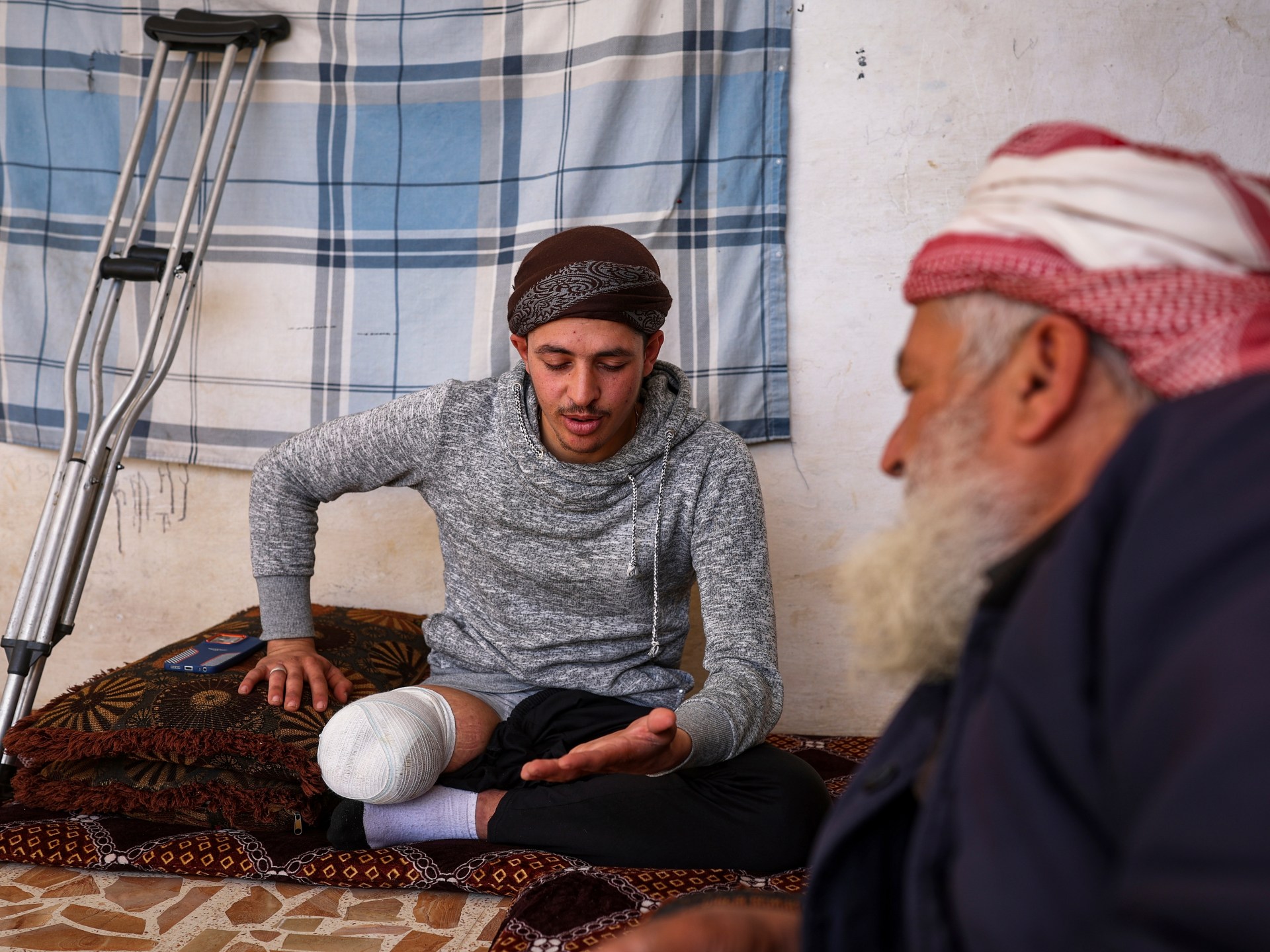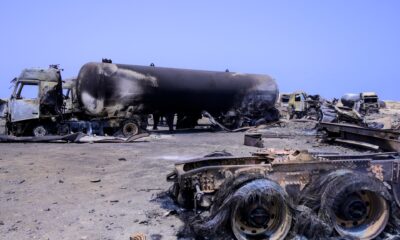Conflict Zones
Jailed for fishing: India-Pakistan tensions trap families in debt, poverty | Border Disputes

Diu, India – Boxes of sweets are being passed around as cheers and joy surround Rajeshwari Rama’s brick house, insulated with tin sheets, in the Vanakbara village of Diu, a federally-controlled island along the India-Pakistan coastline near Gujarat state in western India.
Rama’s relatives and friends are talking at the top of their voices as they celebrate the release of her husband, fisherman Mahesh Rama, from the Landhi jail in neighbouring Pakistan’s largest city of Karachi, in February this year.
Among the attendees is Laxmiben Solanki, 36, standing quietly in one corner. She does not taste the sweets. She is only marking her presence there, but remains preoccupied with thoughts of her husband, Premji Solanki.
Premji, 40, has also been in Pakistan’s Landhi jail since December 2022, along with several other Indian fishermen. Their crime: crossing a disputed border in the Arabian Sea, which divides the South Asian nuclear powers and sworn enemies, for fishing.

In February, Pakistan released 22 Indian fishermen who had been imprisoned by Pakistan’s Maritime Security Agency between April 2021 and December 2022, while they were fishing off the coast of Gujarat – also the home state of Indian Prime Minister Narendra Modi. Three of those released are from Diu, 18 from Gujarat, and the remaining one person from the northern Indian state of Uttar Pradesh.
Though India and Pakistan share a heavily militarised land border, their International Maritime Boundary Line in the Arabian Sea is also largely disputed, especially in a zone called Sir Creek, a 96km (60-mile) tidal estuary that separates India’s Gujarat and Pakistan’s Sindh provinces.
It is in this patch that fishermen from both India and Pakistan wander into deeper waters, often without realising they have entered foreign territory. Due to the terrain of the disputed territory, there is no border fencing, with a marshland acting as a natural boundary between the two nations.
Several years and rounds of diplomatic talks between India and Pakistan have not been able to resolve the dispute, which has even seen military tensions between them. In 1999, India shot down a Pakistani aircraft carrying 16 naval officers over the alleged violation of Indian airspace near their maritime border. The incident occurred just a month after the two countries fought a war in Kargil, a snowy district in Indian-administered Kashmir.
On March 17, India’s Ministry of External Affairs revealed that out of 194 Indian fishermen currently imprisoned in Pakistan, 123 are from Gujarat. According to the Indian government, it has 81 Pakistani fishermen in its custody. Families on both sides say their loved ones have been jailed for a crime they committed “unknowingly” – because they did not know they had ventured inside waters claimed by another country.
Trapped in debt
Pakistan released Mauji Nathubhai Bamaniya, 55, in February because his osteoporosis had gotten worse. “I still can’t believe that I am sitting in my house, in my country, with my family. My decaying bones brought me back to my homeland,” Bamaniya tells Al Jazeera in Vanakbar village.
Another fisherman, Ashok Kumar Solanki, is also back at home in Ghoghla village in Diu. He has hearing and speaking impairments and was among the 22 fishermen released on health grounds.

But it is the families of those still imprisoned in Pakistan that find themselves caught in a cycle of recurring debt and debilitating anxiety.
In another house, hidden amid palm trees in Vanakbara, Kantaben Chunilal, 60, looks with tired eyes at the dusty path leading to her home. She has been waiting for her son, Jashvant, since December 2022.
Jashvant was barely 17 when he was arrested by Pakistani forces. He was the family’s sole breadwinner.
Kantaben says she feels too ashamed to ask her relatives for more loans to fill the empty grain jars in her kitchen. She has borrowed nearly 500,000 rupees ($5,855) from several relatives for sustenance. “The government offers us a financial aid of $3 per day. It is not even half of what our men would earn,” she tells Al Jazeera.
Out of desperation, Kantaben says she sometimes randomly visits relatives during mealtimes, hoping they will accommodate her as a guest and she may save some money that day.
In the same village, Aratiben Chavda married fisherman Alpesh Chavda in 2020. Less than a year later, Alpesh was arrested by Pakistani forces while he was out fishing in the Sir Creek area.
Aratiben tells Al Jazeera their 3-year-old son Kriansh, born about four months after Alpesh’s arrest, has never seen his father. “We make him see his father’s photos, so that one day, when Alpesh comes back, my child can recognise him,” she says, sobbing.
Aratiben’s house is shaded by palm and coconut trees, insulating her and her son from India’s scorching heat. But there is no escaping the poverty that has gripped the household. Selling the refrigerator her parents had given her as a wedding gift supported her for about two months during the winter of 2023.
Aratiben and her mother-in-law, Jayaben, also sell vegetables at the local market, making about $5 to $7 on good days. But she says there are too many days in between when they are unable to afford two meals.

Indian activists and fishermen’s unions have been campaigning for the release of all the fishermen imprisoned by Pakistan.
Chhaganbhai Bamania, a social worker in Diu, points out that under Pakistani law, fishermen who stray into that country’s waters should not be sentenced for more than six months.
“But due to the hostility between India and Pakistan, citizens are caught in a crossfire for no fault of theirs. Their jail time is increased without them knowing or understanding it,” he says, adding that some Indian fishermen end up spending years behind bars.
Bamania says families of jailed fishermen have been writing to top Indian officials to plead for their release, but accuses the government of moving at a “snail’s pace” to try and address their concerns.
‘As if we were terrorists’
This pattern of arrests followed by a long wait for release is not new. Some, like 50-year-old Shyamjibhai Ramji, are repeat visitors to Pakistani jails.
Ramji was arrested three times between 2000 and 2014. When he was released for a third time from a Karachi jail, his son made him swear he would never venture into the sea, “not even in his dreams or rather, nightmares”.
“Catching fish is all I know,” he says. “We follow the stars’ movements while casting nets into the sea at night. Once, I wandered away from Okha Port, once from Porbandar Port. There are many like me who have been jailed more than once,” he tells Al Jazeera, referring to two prominent seaports in Gujarat.
Ramji says he now prefers looking at the sea from a distance to avoid revisiting the “horrors” he faced in Pakistani custody. “They would keep us separately, away from Pakistani prisoners, and kept asking us the same questions, as if we were terrorists or like we were hiding something. When we said we are vegetarians, they gave us grass and boiled water for food. It was a nightmare every day,” he says.
Shekhar Sinha, a retired Indian Navy officer, says the “greed of a larger catch drives fishermen to go beyond that imaginary line on water, often losing track of their exact position”.
“Even Pakistani fishermen are arrested in similar circumstances. Generally, they are exchanged, except for those who fail during interrogations and are unable to answer questions properly,” he tells Al Jazeera.
As efforts to free civilians on both sides of the border continue, women like Laxmiben hold onto hope, making a new promise to their children every day. Her eyes glisten with tears as she and her three teenage children – a son aged 18 and daughters who are 14 and 13 – await Premji’s release.
“I keep telling my children that, ‘Your father will return tomorrow’. But that tomorrow has not happened for four years now. My tongue is tired of lying,” she says as she holds the hands of her elder daughter, Jigna, both looking at the waves hitting the Diu port.
Beyond the waters lies Pakistan. And Premji.
Conflict Zones
Landmines continue to claim lives in post-Assad Syria | Syria’s War News

Suleiman Khalil was harvesting olives in a Syrian orchard with two friends four months ago, unaware the soil beneath them still hid deadly remnants of war.
The trio suddenly noticed a mine lying on the ground. Panicked, Khalil and his friends tried to leave, but he stepped on a hidden mine that exploded. Terrified, his friends ran to find an ambulance, but Khalil, 21, thought they had abandoned him.
Khalil’s left leg was badly wounded in the initial explosion. His right leg was blown off from above the knee in a second blast. He used his shirt as a tourniquet on the stump and screamed for help until a nearby soldier heard him and rushed to his aid.
While the nearly 14-year Syrian war came to an end with the fall of Bashar al-Assad on December 8, war remnants continue to kill and maim.
Mines and explosive remnants – widely used since 2011 by Syrian government forces, its allies and armed opposition groups – have contaminated vast areas, many of which became accessible only after al-Assad’s government collapsed, leading to a surge in the number of landmine casualties, according to a recent Human Rights Watch (HRW) report.
Experts estimated that tens of thousands of landmines remain buried across Syria, particularly in former front-line regions like rural areas of Idlib governorate.
At least 249 people, including 60 children, have been killed and 379 injured by these munitions since December 8, according to INSO, an international organisation that coordinates safety for aid workers.
Landmines not only kill and maim but also cause long-term psychological trauma and broader harm, such as displacement, loss of property and reduced access to essential services, HRW says.
The rights group has urged the transitional government to establish a civilian-led mine action authority in coordination with the United Nations Mine Action Service to streamline and expand demining efforts.
Conflict Zones
US’s Hegseth shared military plans in second Signal chat, reports say | Military News
Reports come after defence chief attracted scrutiny last month over discussions of military plans in another group chat.
United States Secretary of Defense Pete Hegseth shared details about planned bombing raids on Yemen in a second Signal group chat that included his wife, brother and personal lawyer, US media has reported.
The reports come after Hegseth attracted scrutiny last month when the editor-in-chief of The Atlantic magazine revealed that the defence chief had shared details about upcoming air strikes on Houthi rebels in a Signal group chat that the journalist had been accidentally included in.
Hegseth’s discussions in the second group chat similarly involved planned strikes on Houthi targets in Yemen, The New York Times and CNN reported on Sunday, citing multiple unnamed sources.
The information shared by Hegseth in the second chat included “flight schedules for the F/A-18 Hornets targeting the Houthis in Yemen,” The Times reported, citing “people with knowledge of the chat”.
Hegseth set up the second group chat before his confirmation as defence secretary to coordinate with members of his personal and professional inner circle, the outlets said.
Hegseth’s brother, Phil, and his personal lawyer, Tim Parlatore, are both employed at the Defense Department, but his wife, Jennifer, a former Fox News producer, is not.
In response to an inquiry from Al Jazeera, Chief Pentagon Spokesman Sean Parnell called the reports an “old story – back from the dead.”
“The Trump-hating media continues to be obsessed with destroying anyone committed to President Trump’s agenda. This time, the New York Times – and all other Fake News that repeat their garbage – are enthusiastically taking the grievances of disgruntled former employees as the sole sources for their article. They relied only on the words of people who were fired this week and appear to have a motive to sabotage the Secretary and the President’s agenda,” Parnell said in a statement.
Parnell said no classified information had been shared in any Signal chat.
“What is true is that the Office of the Secretary of Defense is continuing to become stronger and more efficient in executing President Trump’s agenda. We’ve already achieved so much for the American warfighter, and will never back down,” he said.
The disclosure of military information in the first Signal group chat, which included top officials in President Donald Trump’s administration including Vice President JD Vance and National Security Advisor Michael Waltz, is currently being investigated by the Pentagon’s acting inspector general.
The latest controversy involving Hegseth’s leadership follows a week of personnel upheaval at the Pentagon.
Four members of Hegseth’s inner circle, including his former press secretary John Ullyot, have been removed over the last week amid a widening probe into leaks of information.
On Sunday, Ullyot said that the Pentagon was in “disarray” and “total chaos” under the defence chief’s leadership.
“The dysfunction is now a major distraction for the president — who deserves better from his senior leadership,” Ullyot wrote in an opinion piece published by Politico Magazine.
Ullyot announced his resignation on Wednesday, following the departures of Colin Carroll, chief of staff to Deputy Defense Secretary Stephen Feinberg; Darin Selnick, Hegseth’s deputy chief of staff; and Dan Caldwell, one of Hegseth’s aides.
In a statement on Sunday, Carroll, Selnick and Caldwell said they had been slandered and subjected to “baseless attacks” ahead of their dismissal.
“All three of us served our country honorably in uniform – for two of us, this included deployments to the wars in Iraq and Afghanistan. And, based on our collective service, we understand the importance of information security and worked every day to protect it,” the three men said in the statement.
“At this time, we still have not been told what exactly we were investigated for, if there is still an active investigation, or if there was even a real investigation of ‘leaks’ to begin with.”
Conflict Zones
Russia-Ukraine war: List of key events, day 1,150 | Politics News

These are the key events on day 1,150 of Russia’s war on Ukraine.
Here is where things stand on Saturday, April 19:
Fighting
Russia launched eight missiles and 87 drones in an overnight attack on Ukraine on Saturday, causing damage in five regions across the country, the Ukrainian air force said. Air defence units shot down 33 Russian drones while another 36 were redirected by electronic warfare. Damage was recorded in five regions in the south, northeast and east.
A Russian missile attack killed one person in Kharkiv, while a drone attack killed another in Sumy, with at least five children among dozens injured. Kharkiv Mayor Ihor Terekhov said 15 residential buildings, a business and an educational facility were damaged in the attack.
The city of Zaporizhzhia was hit by a Russian drone during the night. Regional Governor Ivan Fedorov reported the attack on Telegram, saying a fire had broken out and emergency services were responding.
Russia claimed it targeted Ukrainian drone production sites and warned of escalation if Germany sends Taurus long-range missiles, calling it a step towards direct involvement in the war.
Politics and diplomacy
The US has put forward a proposal to end the war in Ukraine that includes lifting sanctions on Russia, Bloomberg reported, quoting unnamed European officials. The US plan “would effectively freeze” the conflict, with invaded Ukrainian territory remaining under Russian control, according to the report.
US Secretary of State Marco Rubio briefed NATO chief Mark Rutte on the plan, but warned Washington will “move on” if a ceasefire deal doesn’t appear viable within days.
President Donald Trump later warned that the US would “take a pass” on mediating peace if Moscow or Kyiv continue to hinder progress towards ending the war.
Russia and Ukraine will exchange 246 prisoners each on Saturday in a deal brokered by the UAE. The swap, the 13th mediated by Abu Dhabi, will add to a growing list of exchanges since 2022 and brings the total number of captives swapped to 3,233.
A Russian court has sentenced 19-year-old activist Daria Kozyreva to two years and eight months in prison for allegedly “discrediting” the army through antiwar graffiti and quoting 19th-century Ukrainian poetry. Amnesty International condemned the verdict as a “chilling” attack on peaceful dissent and called for Kozyreva’s immediate release.
-
Asia2 days ago
Hong Kong’s oldest Democratic Party is shutting down as Beijing leaves no room for dissent
-

 Middle East2 days ago
Middle East2 days agoUS attacks Yemen again after at least 80 people killed in Hodeidah | Israel-Palestine conflict News
-

 Europe2 days ago
Europe2 days agoPutin declares brief ‘Easter truce’ in war, but Ukraine says it is still under attack
-

 Middle East1 day ago
Middle East1 day agoLebanese president says disarming Hezbollah ‘delicate’ as Israel kills two | Israel attacks Lebanon News
-

 Middle East1 day ago
Middle East1 day agoThe Hawaii of Israel: How Trump legitimised a longstanding Israeli vision | Israel-Palestine conflict
-

 Europe1 day ago
Europe1 day agoStart your week smart: Earth Day, Pope Francis, Alien Enemies Act, Ukraine-Russia truce, ‘50501’ protests
-

 Middle East1 day ago
Middle East1 day agoThousands gather for centuries-old Holy Fire ceremony in Jerusalem | Jerusalem News
-

 Sports1 day ago
Sports1 day agoVaibhav Suryavanshi, 14, makes history in sensational debut as youngest ever player in Indian Premier League history




